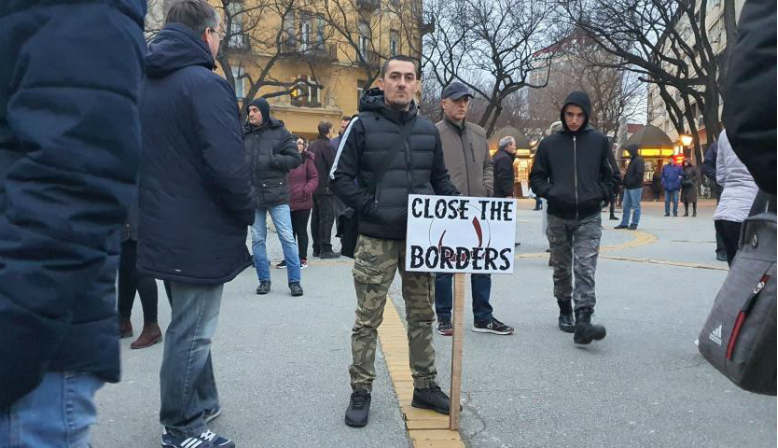 Anti-refugee protests in Subotica. Source: Pannon RTV/Scheller Endre
Anti-refugee protests in Subotica. Source: Pannon RTV/Scheller Endre
Racist patrols and protests are spreading in Serbia, as the far-right seeks to exploit the migrant crisis for political gain, says Vladimir Unkovski-Korica
When news broke that Turkish-EU tensions in Syria had led to Ankara’s cynical decision to stop preventing migrants crossing the EU border on 27th February, the Balkans as the main transit route between Turkey and the EU could not be unaffected.
EU member Hungary has temporarily stopped taking asylum-seekers on the Serbian border, citing fears that migrants are bringing coronavirus from the Middle East and Central Asia.
Serbia’s far-right used the occasion deftly. There are already around 6,000 migrants in Serbia, waiting to pass through to an EU state.
But this is a small number and there have been as many reports of people helping migrants as migrants being targeted – many recall the plight of refugee Serbs during the wars of the 1990s and are keen to show solidarity.
Recent events suggest, however, that the far right is using the situation to score political points ahead of parliamentary elections in April. More than 500 people gathered on the streets of the northern town of Subotica on 29th February to listen to hate speeches and calls for migrants to be sent home.
Other cities in northern Serbia have seen heightened tensions after allegations of migrant attacks on locals. Far-right patrols have appeared in Serbia’s capital, Belgrade, threatening migrants and publicising familiar far-right tropes about migrant threats to Serbian women and girls.
A Facebook call has been launched for a protest against migrants in Belgrade on Sunday 8th March. While only hundreds are registering as attending the event, there are real fears that the far-right could exploit the latest round of the migrant crisis in Europe to its advantage.
Serbia is due to hold parliamentary elections on 26 April 2020 and the far-right smells blood.
Responding to the liberal opposition’s calls for a boycott of the elections amid growing authoritarian tendencies of the part of the illiberal President Aleksandar Vučić, the government has lowered the threshold from 5 to 3 percent, which may be within reach of various right-wing groups.
The government’s move has already succeeded in dividing the liberal opposition, but it has also given the racist far-right added incentive to whip up anti-immigrant feelings in the poor Balkan country.
Vučić, too, has been keen to position himself in relation to the emerging crisis by more openly moving to the right and promising not to allow Serbia to become “a parking lot” for migrants prevented from entering the EU.
This is a cynical move that will only embolden the far right. Everyone can see that Vučić hopes to offer Serbia’s services as an external ‘border guard’ for the EU to gain funds and concessions from the EU in order to gain a faster route to accession.
The far-right is already posing manipulative questions, such as: why is money being expended on foreigners, while it can never be found for ordinary local folk? This is mixed with ever more familiar Islamophobic rhetoric and fearmongering related to the coronavirus, typical of the far-right across Europe, aided and abetted by the EU’s criminal policy of ‘Fortress Europe’.
The left in Serbia will be challenged to respond. Any response would have to couple solidarity with migrants and anti-racist campaigning with credible demands for a more socially just Serbia.
There have been advances for the left in recent years, especially with campaigns like ‘The Roof Over Our Heads’ (Krov nad glavom), which united more than 9 organisations and dozens of non-affiliated individuals to prevent the eviction of families from over 151 homes across Serbia.
Unity in action on the left, if replicated in the coming months, could help to slow and even stem the rise of the far-right, and make the left in Serbia new allies in the wider region’s anti-racist and anti-fascist movements.
It may also help deepen the left’s working class and trade union component, a key step if it is to break out of small left activist circles and into the mass of the population, and thus offer light and hope in an often seemingly dark and hopeless situation.
This article is being published jointly with LeftEast

